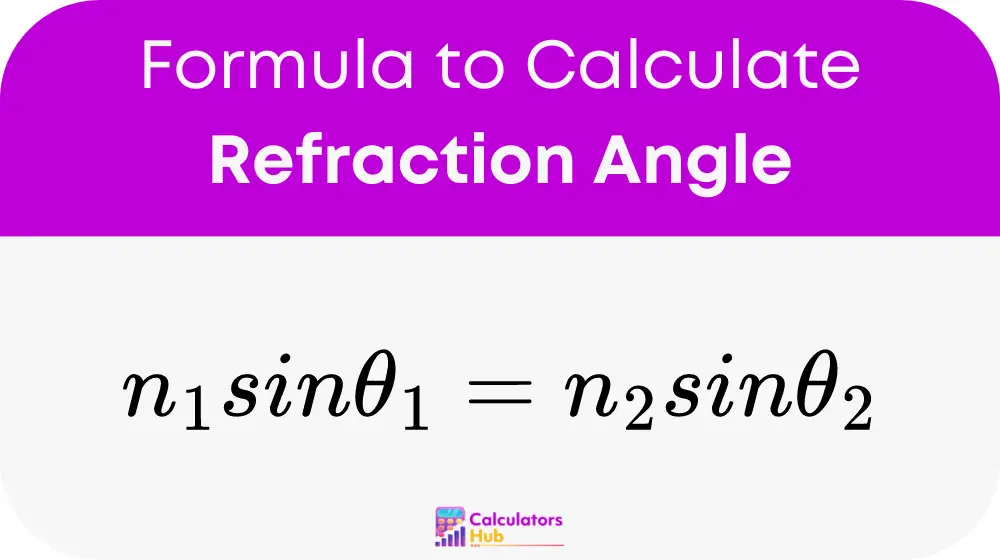The Refraction Angle Calculator is an online tool designed to simplify the calculation of the angle of refraction, based on the indices of refraction of two media and the angle of incidence of light entering the second medium. This tool leverages Snell’s Law, a formula that relates these variables in a concise and predictable way.
The Formula of Refraction Angle Calculator
Snell’s Law is articulated as follows:

Where:
- n1n1 (the refractive index of the first medium) represents how much the light slows down in the first medium.
- θ1θ1 (the angle of incidence) is the angle at which light hits the boundary between the two media.
- n2n2 (the refractive index of the second medium) indicates the light speed alteration in the second medium.
- θ2θ2 (the angle of refraction) is the angle at which light travels away from the boundary in the second medium.
Solving for the Angle of Refraction (θ2)
To find θ2θ2, rearrange Snell’s Law:
sin θ₂ = (n₁ sin θ₁) / n₂
Then, calculate θ2θ2 by taking the inverse sine (arcsin) of both sides:
θ₂ = arcsin((n₁ sin θ₁) / n₂)
This calculation will give you the angle of refraction, crucial for designing lenses, glasses, and various optical instruments.
Practical Application Table
This table provides quick reference values to estimate θ2θ2 without detailed calculations, useful for exams and quick checks:
| n1n1 (Air) | θ1θ1 (Degrees) | n2n2 (Water) | θ2θ2 (Calculated) |
|---|---|---|---|
| 1.0 | 30 | 1.33 | 22.33° |
| 1.0 | 45 | 1.33 | 32.39° |
| 1.0 | 60 | 1.33 | 40.49° |
Example of Refraction Angle Calculator
Let’s calculate the angle of refraction for light entering water from air with a 30° angle of incidence:
- Inputs: n1=1.0n1=1.0 (air), θ1=30°θ1=30°, n2=1.33n2=1.33 (water)
- Calculation:
θ₂ = arcsin((1.0 * sin(30°)) / 1.33) θ₂ = arcsin((0.5) / 1.33) θ₂ ≈ 22.33°
This output shows that the light will refract at an angle of approximately 22.33° into the water.
Most Common FAQs
The refractive index measures the speed reduction of light in a medium, essential for predicting how much light bends when entering a new medium.
The angle of incidence is typically measured from the normal (a perpendicular line) to the surface at the point of contact where light enters the new medium.
Absolutely! This calculator is versatile and can be use to design and analyze the behavior of light in lenses and prisms by providing accurate refraction angles.